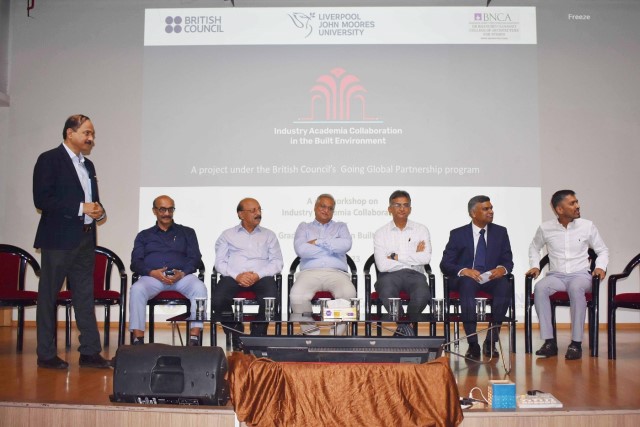PUNE: Collaboration between business and academia involves teaching students new skills that are in line with market demands. In order to identify the knowledge and skill gaps and skill sets in the current graduate students in order to make them employable, MKSSS’s Dr. Bhanuben Nanavati College of Architecture for Women (BNCA) hosted a day-long Industry-Academia Collaboration Workshop on the 19th of July. The aim of the workshop was to provide a focused group conversation that would strengthen and validate the study-based curriculum.
The Going Global Partnership program’s goal is to encourage teamwork and creativity in teaching and learning to support transnational education in higher education institutions between India and the United Kingdom. The research is being carried out by an Academia-industry consortium formed in collaboration with Liverpool John Moores University, UK; MKSSS’s Dr. B. N. College of Architecture, Pune, Pune Construction Engineering Research Foundation, and Rohan Developers Pvt. Ltd under the British Council’s Going Global Partnership program.
Dr. Mohan Siriwardena, a professor at Liverpool John Moores University’s School of Civil Engineering and the Built Environment, Mr. Ranjeet Naiknavare, President of CREDAI Pune Metro, Rajesh Chaudhary, Vice President of CREDAI Pune Metro, Jaydeep Raje, Director of Bhate and Raje Construction, Mr. Abhishek Bhatewara, Executive Director of Rohan Builders, Dr. Anurag Kashyap, Principal of Dr. Bhanuben Nanavati College of Architecture for Women (BNCA) and Dr. Vaishali Anagal, Associate Professor and project coordinator at BNCA were present for the launch of the project website. The project website, www.iacbe.bnca.ac.in was unveiled at the hands of Mr. Ranjeet Naiknavare, President of CREDAI Pune.
In the welcome address, Dr. Anurag Kashyap, Principal of BNCA spoke about BNCA‘s vision towards global education and strategies, which allows students to go beyond the four walls of the classroom and have believed that many of the students have gone beyond the syllabus. BNCA always encourage their students to interact with professionals from the industry who are living success stories. Dr. Vaishali Anagal, a professor at BNCA, stated in her introduction that special efforts could be taken to impart talent to the learner in all of its nuances and simplicity. In order to achieve that, the knowledge and skill gaps in the field should be filled, the hourly structure should be established, and a sustainable training environment should be developed while conducting new research.
The goal of the workshop that was held on this particular occasion was to introduce the knowledge and abilities needed for this course, as well as to enhance the new graduates’ skills and prepare them for this work. For this event, the brightest brains in the construction industry came together to discuss, validate and restructure the curriculum that is based on project research. Dr. Vaishali Anagal and Dr. Sujata Karve conducted the workshop. Dr. Mohan Siriwardena, a professor at Liverpool John Moores University’s School of Civil Engineering and Built Environment, said that as part of this international collaboration, we are considering a degree-based apprenticeship as a potential model to close the skills gap. Not only is training important but so is teaching new skills. It’s important to use the apprenticeship in a purposeful and pertinent capacity. Additionally, he discussed the common framework of the program structure, which includes fundamental criteria like industry-developed professional standards. Mr. Ranjeet Naiknavare, President of CREDAI Pune Metro, who hailed the various initiatives undertaken by BNCA, spoke about the challenging part of making fresh graduates employable. According to Mr. Naiknavare, the nature of the Civil Engineering and Construction sector requires hands-on exposure, therefore we need to have a transformational educational system to meet the requirements of the industry.
On the second day of the workshop, Dr. Mohan Siriwardena, a professor at Liverpool John Moores University’s School of Civil Engineering and Built Environment, presented a lecture on lean construction, its principles, and its future prospects. He says we need to put more effort into streamlining the intricate construction process and reducing waste. He also discussed the importance of filling skill gaps, upskilling, and reskilling, as well as how institutions may play a crucial part in putting this concept into practice.

